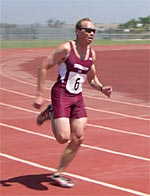A chat with M45 James Chinn, world, national 400 champion

James Chinn of San Marcos, California, burns the second turn of a 400 at a San Diego meet in June 2004. Consistently in the low 52s, he ran twice under 52 at the World Masters Athletics Championships in San Sebastian, Spain, one member of an amazing USA M45 team that won every distance from 100 to 1500, plus the 400 hurdles, high jump, weight throw and weight pentathlon. Chinn also won medals in the 4x100 and 4x400 relays at worlds. Chinn runs for Speedwest TC.
Posted October 8, 2005
By Ken Stone
James Chinn grew up where it was hot but didn’t really start to sizzle in track until after turning 40. Born Nov. 26, 1958, in Tucson, Arizona, where he graduated from Rincon High School in 1976 and the University of Arizona (with an architecture degree) in 1981, he moved to San Diego County after graduation and never left. Now lives in San Marcos, north of San Diego. His all-time bests (all at age 19): 10.9 for 100, 22.8 for 200 and 49.8 for 400. He’s attended four USATF masters nationals and one WMA world championship, winning nine medals in nationals including relays, and three medals at worlds including relays.
Masterstrack.com: What do you do for a living? And how do you carve out time to train?
Chinn: I’m an architect with my own firm; this allows me to set my own hours. So I start very early in the morning and then I can work out in the late afternoon.
You trained for a time with World Championship silver medalist Tyree Washington, also a 400-meter man. Did you run any reps with him, give him any advice? Or did you get help from him?
I had the opportunity to train with Tyree almost every day for about six months. We always started together and he seemed to always finish ahead of me. I can truly say I never gave him any advice, but I did learn a lot about training and running the 400 from him.
How many races did you run at Hawaii nationals? How many at San Sebastian? How do you fight off the aches and pains for so many competitions?
In Hawaii I ran six races and in Spain I ran nine races. I usually train several days in a row, so I’m used to running fast on consecutive days. I was definitely tired by the end of the meet in Spain, but fortunately, nothing hurt.
Give me a typical late-season sprint workout — reps, rest and times?
This past year I started running 350s and 375s, usually 3 reps — all run at 53-second 400 pace.
How did you learn about masters track? What was your first masters competition?
I had heard about masters track, but it wasn’t till I saw an article about a local runner six years ago that I was able to get real information about it. My first competition was in July 2001. I ran the 100 and 200 and couldn’t walk for five days.
You’ve been nominated for GeezerJock of the Year by the new masters sports magazine. Do you mind being called a GeezerJock? What would the honor mean to you?
I think the name Geezerjock is great for the magazine since it’s still a hot topic of discussion. I’ve actually never been called a “geezerjock,” but I don’t think I’d mind, I’ve been called a lot worse. Winning the award would be an incredible honor. There are so many outstanding athletes out there in so many sports that it’s hard to imagine winning over all those people.
Some elite USA masters athletes have groused that they don’t get the same support as open USA athletes. Should USATF find a way to subsidize the top American masters athletes — help pay their way to world championships, for example?
It would be great if we got some support, but with all the age groups and number of quality athletes, I don’t know how they would do it.
Even though drug-testing is exceedingly rare in masters track (only a few dozen get tested at world meets), are you careful about what you ingest?
We all know what’s legal and not. I think anyone doing steroids in masters track is crazy, we’re out here to have fun, not put our bodies at risk.
You did much better in the 400 this year than the 1 and 2. What have you learned from Hawaii and San Sebastian, and would you consider runing the 800?
In Hawaii I was running the 400 different than the way I trained for it; in Spain I got back to running it the way I train and it made all the difference in the world. At the end of last season, I ran a couple workouts with Steve Scott’s 800-meter runners at Cal State San Marcos. After doing that, I will never race an 800. A few sprinters such as Kettrell Berry and Robert Thomas can handle the 800, Jim Watts has moved up from the 400 and done well, but I’ll leave that to them.
What’s your advice to folks entering masters track?
Just come out and run at whatever level you’re at, you’ll have the time of your life.




